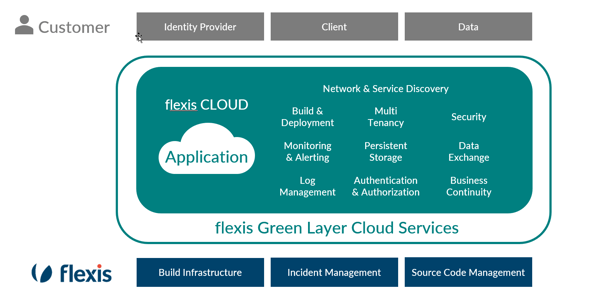How Can Cloud Platforms Support Supply Chain Management
Ute Strohmaier - October 17, 2023

The global cloud computing market has witnessed explosive growth in recent years, with revenues soaring to new heights. In 2022, services in the public cloud generated a staggering $491 billion in global sales, according to Statista. As of Q2 2023, Microsoft Azure held a significant market share of around 26 percent in the cloud infrastructure services segment. Amazon Web Services (AWS) maintained its stronghold as the market leader with a dominant market share of over 30 percent, contributing to a total revenue of $72.4 billion in the same period. Cloud computing, often referred to as the migration of computing resources, storage, and software applications to remote servers, has reshaped industries by offering scalability, cost-efficiency, and flexibility.
In this article, we will delve into the transformative potential of cloud platforms in supply chain management.
Example of a Cloud Platform for Supply Chain Services
The flexis Supply Chain Cloud Platform is a cloud-native supply chain platform designed to empower businesses with the tools required to rapidly and cost-effectively create tailor-made supply chain optimization solutions. It supports enterprises in an era where agility and adaptability are paramount.
Key Features of the Cloud Platform for Supply Chain Technology:
1. Modular Design: The platform offers a modular approach, allowing businesses to choose and integrate the specific services they need. This ensures that supply chain solutions are customized to meet the unique requirements of each organization.
2. Rich Web Applications: Leveraging HTML5 technology, the platform offers rich web applications that are not only visually appealing but also highly functional and user-friendly.
3. In-Memory Databases: High-performance in-memory databases ensure that data is processed quickly and efficiently, enabling real-time decision-making.
4. Open Technology: Embracing open-source technologies such as Linux and containers, as well as Kubernetes for container orchestration, ensures compatibility and flexibility.
5. Interfaces & APIs: A range of interfaces and APIs facilitate seamless integration with existing systems and technologies.
6. DevOps and Agile Culture: Short release cycles and automated CI/CD (Continuous Integration/Continuous Deployment) pipelines foster a culture of DevOps and Agile development, ensuring rapid delivery of business applications.
Benefits of the flexis Cloud Platform
1. Rapid Delivery: Customers can quickly deploy custom-fit supply chain optimization solutions, enabling them to stay ahead of evolving market demands.
2. Security and Reliability: The platform offers secure, reliable, and scalable operations for business applications, providing peace of mind for users.
3. Integrable: It operates as an integrable platform, allowing businesses to seamlessly connect with other systems and tools.
4. Fully Managed SaaS Solutions: Users benefit from fully managed Software-as-a-Service (SaaS) solutions, eliminating the hassle of maintenance and updates.
Resource Scalability
The platform's green layer provides essential services out-of-the-box, including firewall and security, monitoring and alerting, log management, multi-tenancy support, persistent storage, secure data exchange, authentication and authorization, business continuity, build and deployment tools, and easy integration capabilities.
Multi-tenant software architecture allows multiple users to share a single instance of a software application and its resources. This architecture forms the basis for most SaaS offerings, making it highly adaptable and scalable.

Cloud Agnosticism
One of the standout features of the flexis cloud platform is its cloud-agnostic nature. It enables the deployment of cloud services on any cloud, whether it's private or public, including Azure, AWS, or Google.
Supported Formats and Protocols
The platform supports various data formats, including Parquet, Protobuf, JSON, CSV/Excel, and proprietary formats. It also offers support for various protocols such as REST/OpenAPI, gRPC, BLOB storage (S3), message queuing, and even one-click Excel export, ensuring compatibility with diverse data sources and systems.
The flexis Supply Chain Cloud Platform represents a significant opportunity for businesses aiming to enhance their supply chain resilience while minimizing the risks associated with new software implementation. With its modular design and open technology stack, it offers a perfect fit without the pitfalls of custom code development. Businesses can gain higher efficiency in their supply chain operations, thanks to the platform's scalability, which leads to a rapid return on investment (ROI).
In a world where supply chain disruptions are becoming increasingly common, embracing innovative solutions as described above can be the key to maintaining a competitive edge and ensuring business continuity. As the cloud market continues to evolve, businesses that leverage these cutting-edge technologies will be better positioned to thrive in the ever-changing landscape of global commerce.
If you want to learn more get your Guide "Why the cloud is the future of manufacturing"
In this Guide you will learn:
-
New potential of cloud-based manufacturing
-
Opportunities of the cloud for the production
-
Technological advantage of flexis technologies
LATEST POSTS
- Understand Circular Economy in The Manufacturing Industry
- How Can Industry 4.0 IT Integration Be Achieved Smoothly?
- The Significance of Order Sequencing in Discrete Manufacturing
- How to improve your Supply Chain Management: The Power of Control Towers
- Optimizing Human Resource Scheduling in Manufacturing: A Technological Approach



